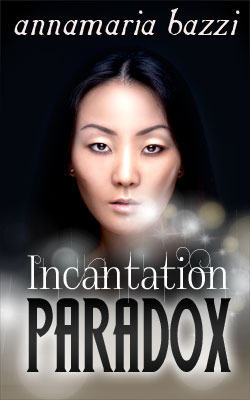P.C. Zick's Blog, page 35
April 11, 2014
Book Review Friday – Underground Angel
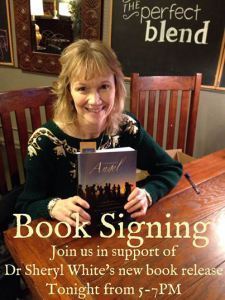
Dr. Sheryl White with her historical novel, Underground Angel
Underground Angel by Sheryl D. White, Ph.D., touched my heart so many ways that I’m finding it difficult to begin this review. Dr. White deftly takes the historical figure, Laura Smith Haviland, and lovingly creates a novel depicting the life and times of a woman noted for her unwavering dedication to the abolition of slavery. For me, the reading of this novel was a personal journey as well. (Click here to read interview with Dr. White on Author Wednesday).
I grew up in southeastern Michigan, calling Laura Smith Haviland “Aunt Laura,” even though she died more than fifty years before my birth. I knew very little about her except for a statute of her in Adrian, Michigan, heralding her work with the Underground 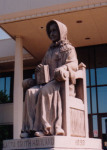 Railroad. Last year when I began pulling together my own great grandfather’s memoir Civil War Journal of a Union Soldier, I learned more about this heroic woman.
Railroad. Last year when I began pulling together my own great grandfather’s memoir Civil War Journal of a Union Soldier, I learned more about this heroic woman.
Only upon researching her did I discover that everyone called her Aunt Laura because of her dedication to humanity. She worked tirelessly to ensure young women and African Americans received an education. She advocated for the abolition of slavery and became a leader in the Underground Railroad. She also fought for women’s suffrage although she died two decades too soon to see women receive the vote. Her Quaker upbringing created in her the quest to help all those who suffered at the hands of inequality. She worked tirelessly for the Freedmen’s Board in several states, including Kansas, which is how Dr. White became familiar with Aunt Laura’s work in her studies and her work in Haviland, KS, a town named for the tireless Laura Haviland.
I attempted to read Aunt Laura’s autobiography Laura S. Haviland: Woman’s Labor and Lifework, but found the recounting of her life as dull as the title of the book. When Dr. White contacted me after discovering Civil War Journal of a Union Soldier, I was very excited to discover her newly released novel, Underground Angel. This is the story of a woman of God who worked tirelessly under one simple creed: In God’s eyes we are all created equal and deserve equal access and respect as humans simply “being.”
Dr. White points out the absurdity of the notion of slavery and all its inherent cruelties of “owning” another person as property. Aunt Laura’s faith remains strong throughout, even when the laws of the land do not support her conviction that no one may own another.
Through most of the years of the Underground Railroad and Aunt Laura’s association with it, she appeared on countless “Wanted dead or alive” posters with a $3,000 bounty on her head for her “illegal” and “dangerous” activities. The criminalization of Laura Haviland probably aided her in her work and her ability to pass in and out of slave states unnoticed. This highly wanted criminal was less than five feet tall and may have weighed no more than ninety pounds, only after swimming in her Quaker clothing.

Laura S. Haviland – Wanted Dead or Alive
Dr. White chronicles Ms. Haviland’s encounters with figures from the history pages, such as Sojourner Truth, Elizabeth Comstock, and Susan B. Anthony. The story of George and Eliza Harris is recounted in this novel as well. These names may not sound familiar, but they are a part of Harriet Beecher Stowe’s book Uncle Tom’s Cabin, and the Mrs. Smyth who helps them escape is none other than “my very own Aunt Laura.”
The novel form brings Aunt Laura’s life and words into focus in the deft hands of Dr. White. The author is a skilled writer and a storyteller with a vision of using the life of Laura Haviland as an example for young Christian children today.
I believe Dr. White has painted a portrait on a much larger canvas. Laura Smith Haviland’s story is an example for all people of all religious persuasions. Dr. White shows us a woman whose faith is so strong she fears nothing except that her fellow men might be diminished by the lack of character and morality in others. She stands strong in her beliefs even when life brings her down roads of unbelievable sorrow. In 1845, in a horrifyingly short time, she lost her husband Charles, her youngest child, her mother, father, and her sister to an epidemic sweeping Michigan.
She carried onward with the faith she would see her loved ones one day again. She fought the prejudice of the time against her as a single mother of seven children, and then she began her work in helping slaves escape to freedom in Canada.
Dr. White showed the irony that Aunt Laura herself must have felt when she went from being a criminal breaking the laws of the slave states, to watching slave owners become the ones breaking the law after the signing of the Emancipation Proclamation.
Underground Angel also depicts the work Aunt Laura did during and after the war as she continued in her fight to see that all people received equal treatment under God’s law that guided her every breathing moment.
I thank Sheryl White for writing this beautiful novel of faith, love, and equality. She’s given us a hero for which we all should strive to emulate.
Note: I found during the reading of Underground Angel that I am related by marriage to Laura Smith Haviland, a relationship of which I’m extremely proud. Laura and Charles Haviland had eight children: Harvey, Daniel, Esther, Anna, Joseph, Jane, Almira, and Lavina (the baby who died in 1845). My great grandfather, Harmon Camburn, whose memoir I published as Civil War Journal of a Union Soldier, grew up in Adrian, Michigan, and had many older brothers and sisters, three of whom married three of Aunt Laura’s children. Daniel Haviland married my great, great aunt Mary Jane Camburn. Esther Haviland married my great, great uncle Almond Camburn, and Anna Haviland married my great, great uncle Levi Camburn. Levi is referenced in Underground Angel as Aunt Laura’s son-in-law, who had to be convinced that the cruelty of slave owners could not be tolerated. When Aunt Laura died in 1898, her body was brought home to Adrian and rested for viewings in the home of my great grandfather. After reading Underground Angel, I feel even prouder and more entitled to call her by the loving name of Aunt Laura.
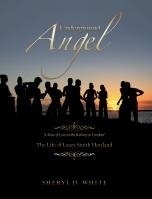
To purchase Underground Angel:
Please visit Dr. White’s website: Underground Angel
Click here for Barnes and Noble
Click here for Xulon book page
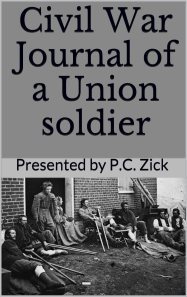
Click on cover to purchase
.


April 9, 2014
Author Wednesday – Sheryl White
Welcome to Author Wednesday. It is with great pleasure that I introduce today’s author, Sheryl White. The subject of her work of historical fiction, Underground Angel, is close to my heart. Dr. White writes about the very real Laura Haviland who worked tirelessly in the 1800s for abolition, suffrage for women, and education for all people regardless of race and sex. I’ve written about Mrs. Haviland, or “Aunt Laura” as I grew up calling her, on my blog Living Lightly. Everyone who knew her called her that because of her loving care of all human beings.
Dr. White published her book a month after I published my great grandfather’s Civil War Journal of a Union Soldier. She contacted me through the Facebook page for Civil War Journal, and I’m so glad that she did.
She’s created a portrait of a woman in her work of fiction that deserves its title: Underground Angel.

Welcome Sheryl. I’m so happy to have you drop by today. You’ve written quite a piece of historical fiction in Underground Angel. Do you remember when you first discovered your voice as a writer?
I wrote my first book at age eleven. It was a group of pages stapled together entitled, “My first book!” As a child, I read a lot and envisioned myself as a writer one day. Writing my book Underground Angel has given me a voice, and it’s very satisfying.
That’s a great title for your first book. I always love to hear about the moment when a writer is finally able to call herself a writer. It took me many years. When were you first able to call yourself a “writer” or “author?”
There is a powerful image in the term “author.” The week my book was published, my friends started calling me an “author.” That was very meaningful to me.
That’s wonderful that your friends recognized it for you. What are your writing rituals?
I approach writing as a student. In my course of study, many papers were required. I actually have always enjoyed the writing (not always the research) so I just set a goal and keep flowing.
I’ve always enjoyed researching, but putting it all together is certainly more fun. Rachel Carson (Silent Spring) said she never chose a subject because as a writer, the subject chose her. Did this happen for you?
Certainly Underground Angel found me. The thought of writing such a book came after I saw there was a need to inform others about her great sacrifice and achievement.
Yes, Mrs. Haviland’s story is certainly one that needs to be heard. What messages or themes did you try to convey to your readers in Underground Angel?
I approach life from a faith perspective, which I project in my writing, and in particular, the message of living out our convictions in serving and caring for others as Mrs. Haviland so courageously did. I want Christian young people of our current generation to understand the sufferings of race due to bigotry and greed. I also want them to recognize the difficult sacrifices made by people of faith living out their convictions and principles. (Jn 15:13).
I love the title. How did you choose it and has it always been the title even through the first drafts?
It was just an obvious, easy title. It fit. Yes, Underground Angel was the first name I chose.
How long do you estimate it took you to take this book from an idea to its final published version?
The idea was planted in 2003, some ten years before it was completed. I had read Mrs. Haviland’s autobiography (A Woman’s Life Work: Labors and Experiences), several times, and 2009, I read it again to refresh my memory. I started writing in February 2010, and it was published November 2013.
When I was putting together my great grandfather’s memoir, I tried reading her autobiography, but the language was very difficult to follow. I was so happy when you told me about your book. It’s much more understandable and dialogue helps tremendously. Is the book traditionally or self-published?
I self-published with Xulon. I felt I had an important message to get out that was time sensitive. Authors I visited with assured me that this was a good way to go to get my work out.
I’m glad you made that decision. You mention the message of the book. What is the message you tried to convey?
True meaningfulness comes in serving others rather than a self-serving mentality that is prevalent today.
That’s a very important message, and I hope your book is read by many young folks. What is one the best things that’s been said about Underground Angel?
“Sheryl White’s narrative is an immersive, emotionally charged experience, one from which no reader will emerge unchanged.” This is what Eddie Cruz, my Xulon editor, shared, and it certainly is the best I could ever hope for out of my work. Several friends told me that when they watched the Oscar award-winning movie 12 Years a Slave, they punched the person next to them and said, “This is just like Sheryl’s book.” But, this statement really impacted me as well, as it carries significant meaning:
“Dr. White brings such a richness to Aunt Laura Haviland and her faith and untiring work to help those less fortunate. Thank you for publishing this important book, and thank you, Dr. White, for writing it.” – Patricia Zick
Yes, I did leave that comment on an article about your book. I’m glad you liked it. That’s also very high praise to be compared to that powerful movie. Taking a real person and turning their life into a fictional piece is quite tricky. How did you conceive of doing it this way?
My historical fiction book was based on Mrs. Haviland’s life story, but the fiction sections were those I created projecting what her life must have been like given the nineteenth century socio-political realities. I tried to make her home and family life “real” and believable with all of the emotions that would be involved in today’s everyday life.
It worked. It takes her off the pedestal and makes her real, yet after reading it, it’s clear she deserves to be up on that pedestal. What type of research was required to write Underground Angel?
I read Laura Haviland’s autobiography several times, along with Mildred Danforth’s biography on her life-A Pioneer Woman. I traveled to Adrian, Michigan, her hometown, for a tour of her stomping grounds. I visited some underground sites, her home place where the Raisin Institute historic marker stands, the Raisin Valley Friends Church where there is a designated historical marker, and the Lenawee County Historical museum. The museum has a Laura Haviland designated room, and the statue of her stands in front of the museum.
Thank you so much for stopping by today, Sheryl. I hope one day we can meet in Adrian and explore Aunt Laura’s and my great grandfather’s “stomping ground.”
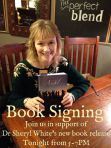 About Dr. White: Dr. Sheryl White has served as the Director of Lay Ministries at the First United Methodist Church in Pratt, Kansas for eight years. Sheryl received her Doctorate of Ministry Degree in 2004 from Houston Graduate School of Theology.The dream to create Underground Angel arose from her doctoral dissertation, The Haviland Heritage Foundation: Extending the Life of Laura S. Haviland in 21st Century Haviland and Beyond. Sheryl lived and served the community of Haviland, Kansas for twelve and a half years serving as an instructor at Barclay College and Minister of Christian Education at the Haviland Friends Church. She is a graduate from Anderson University School of Theology, Anderson, Indiana earning two degrees, a Master of Divinity and Master of Arts in Theology and Ethics.
About Dr. White: Dr. Sheryl White has served as the Director of Lay Ministries at the First United Methodist Church in Pratt, Kansas for eight years. Sheryl received her Doctorate of Ministry Degree in 2004 from Houston Graduate School of Theology.The dream to create Underground Angel arose from her doctoral dissertation, The Haviland Heritage Foundation: Extending the Life of Laura S. Haviland in 21st Century Haviland and Beyond. Sheryl lived and served the community of Haviland, Kansas for twelve and a half years serving as an instructor at Barclay College and Minister of Christian Education at the Haviland Friends Church. She is a graduate from Anderson University School of Theology, Anderson, Indiana earning two degrees, a Master of Divinity and Master of Arts in Theology and Ethics.
To purchase Underground Angel:
Please visit Dr. White’s website: Underground Angel
Click here for Barnes and Noble
Click here for Xulon book page


April 4, 2014
Book Review Friday – Unthinkable Consequences
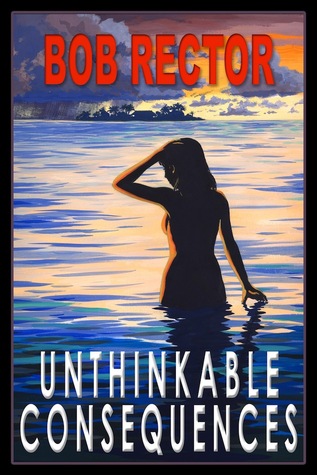 Unthinkable Consequences by Bob Rector
Unthinkable Consequences by Bob Rector
Any book that begins in the Florida Keys with the main character as raw and organic as the landscape, captures my attention quickly.
“The flora here was wanton, shamelessly beckoning to be pollinated.
Like me, Paula thought, I need pollinating bad.”
And so begins Unthinkable Consequences by Bob Rector.
Rector has created a fast-paced romantic thriller, filled with a lush setting, despicable villains, sex-crazed creeps, and love-seeking heroes.
Kurt and Paula as the protagonists of the story match each other in stature, desirability, and thirst for love. As in any good novel, there’s a catch. She’s married, and he’s involved in the heist of emeralds. It makes starting a life together a bit complicated no matter how many sparks fly when they are in the presence of one another.
Paula prepares for her new life as if getting ready to attend a garden party, while Kurt secretly plots their escape. It makes for some thrilling mishaps.
While this novel is plot-driven, Rector manages to create some powerful characters. Of course, Paul and Kurt dominate the plot landscape, but other minor characters play major roles in the movement of the plot toward its drawn out climax.
The mother-in-law is a portrait of a woman who sees herself in Paula, and so projects her shortcomings onto her daughter-in-law. The two chiefs in this household create such a tension, the reader wonders why Paula didn’t leave years ago. Paula’s son is every parent’s worst narcissistic nightmare. And the husband? He’s so unsympathetic that even the staunchest proponent of marriage couldn’t possibly be rooting for Paula to fail in her attempts to leave.
Kurt is such a hunk of a bad boy that it’s easy to imagine why Paula’s hormones take her right into his arms, despite the lies, deceit, and danger. It’s through her revelations and reactions that the real romance of this story is revealed. Paula is able to come into her own as an independent woman, which may not seem a big deal, until it’s taken into account that the story takes place in the 1950s of Palm Beach, Florida.
Unthinkable Consequences is breathtaking in its descriptions of the Florida Keys, Florida Bay, and the Everglades. Rector paints a majestic view of the setting. But even more intriguing is the step into the past. The story occurs in 1959 when women didn’t leave their despicable husbands, when convertibles were the height of sophistication, and when cigarettes were romantic accouterments for every tryst. I enjoyed reading a novel without cell phones to rescue stranded boaters, a GPS to guide lost vehicles, and the Internet to search for the answer to every puzzle.
Unthinkable Consequences provided me with everything I love about reading: a fast-paced plot with thrills, main characters seriously flawed, yet with hope for redemption, and a landscape lush with sandy beaches, laughing dolphins, and mangrove-lined streams leading to a mysterious and sensuous home.
Rector is an author who knows and loves Florida. He also understands love and all its intricacies. It’s a pleasure to read a story written by a man who has the rare capability to understand the nuances of a woman’s mind and the single-minded focus of a man’s determination.
Click here to see my interview with Bob Rector on Author Wednesday.


April 2, 2014
Author Wednesday – Bob Rector
 Welcome to Author Wednesday. Today I’m pleased to introduce, Bob Rector, whose book Unthinkable Consequences is a fast-paced thriller with lots of sensual romance. I’ll be reviewing the book on Book Review Friday so I won’t say much more than the book was a wonderful surprise.
Welcome to Author Wednesday. Today I’m pleased to introduce, Bob Rector, whose book Unthinkable Consequences is a fast-paced thriller with lots of sensual romance. I’ll be reviewing the book on Book Review Friday so I won’t say much more than the book was a wonderful surprise. 
Welcome, Bob. It’s pleasure to interview you today. Let’s start with my favorite question for my favorite authors. When were you first able to call yourself a “writer” or “author?”
From the first day I started working in TV in March of 1970. I was hired to write, direct, shoot and edit music film shorts (they weren’t called videos back then) for pop artists of the time – a one-man band. I had to deliver a finished 2-12/ to 3-1/2 minute film every day so I learned how to formulate plots and characters fast. Usually the scripts were hand written on notebook paper. I made approximately 100 films for the shows “Now Explosion,” and “Music Connection,” and learned more about storytelling during that time than if I’d taken a college writing course.
You learn quickly on that type of deadline. I know I did as a reporter, and it wasn’t nearly as demanding as writing shows. Do you have a particular theme in your writing?
If I gave thought to messages or themes before I started writing, I’d never get anything written. Most of my writing has been assignment based, but when it’s not, it comes from a story on the news, or an incident I personally witnessed, or a comment somebody made. It plants a seed in my imagination and I’m off and running. As the work develops, messages and themes occur naturally.
Who has most influenced your writing ?
In my genre, Raymond Chandler and his disciple John D. MacDonald. Their dialogue sparkled, their writing style was clean and sparse, and their characters not only had muscles and beauty, but heart too. You could also throw in Erle Stanley Garner.
Do all your books have a common theme or thread?
I guess the most common theme in my work is redemption. Stories are usually about conflict and that usually arises from people not being very nice to each other. At a certain point in the story, they have to become aware of that then seek, and hopefully achieve, redemption. It makes us root for them. If they don’t make an attempt, they’re pretty shallow characters.
That’s always a favorite of mine. Do you have a favorite character that you created?
Paula, the main character in Unthinkable Consequences, is my favorite. I didn’t know If I could immerse myself into a female character to the extent required. This is not meant to be derogatory in any way. To state the obvious, men and women think and act differently. I wanted Paula to be completely believable, especially to female readers. It was scary, but also fun, getting into her head. Luckily I had many close gal friends, my wife first and foremost, who were willing to drop the veil and help me keep Paula honest in her femaleness.
I’m sure she was fun to create. You did a remarkable job of portraying this trapped canary in the world of the 1950s of Palm Beach. Now that I’ve mentioned Florida, how does setting play a role in your books?
Having worked in visual mediums most of my life, setting, or location, is extremely important to me. Unthinkable Consequences takes place in South Florida in the late 1950s, and it literally could not have taken place anywhere else. I know, I tried. I think setting should visually (even if it’s in the mind) reflect, and often amplify, the action, mood, and passions of the story. I needed a place that was still somewhat wild and primitive, hot and sultry. The Keys provided that.
Yes, I agree. What kinds of techniques do you like to use in your writing?
I’m big on pacing and narrative thrust, probably because of my years working in film. And I work hard not to let the reader get ahead of me. In TV, we were always aware of the viewer sitting there with the remote in his/her hand. Lose their interest and their off to another channel. I never forgot that and I think writers should keep it in mind too. Imagine that your reader has a remote in their hand.
What’s the best thing said about one of your books by a reviewer?
When Claude Nougat reviewed my book, she said, “He has produced a thriller-romance that is not merely an unusual love story but a deep excursion into the psyche of one very tormented woman – something of an exploit for a male writer. The only other writer who manages to portray a woman’s anxieties as brilliantly (that I know of) is Flaubert. But what Bob Rector has done, is give us a thoroughly modern version of Madame Bovary. His Paula is a fascinating character – and equally explosive.”
Wow – I can see why that would bring some cheer to the writer’s heart. How did you choose the title and has it been the title from the beginning?
No. The only project I’ve ever worked on that the title never changed is my play “Letters From The Front” – and if I could change it, I would, but it’s been out there too long. Before my book became Unthinkable Consequences, it was “Pathetique,” “Wages of Love,” “Into the Fire,” and “The Woman Who Did Just As She Pleased.” As the manuscript developed, none of these seemed exactly right. It was my wife, Marsha Roberts, who came up with Unthinkable Consequences, and I knew itwas right the minute she said it.
It’s a great title and very appropriate. How long do you estimate it took you to take the book from an idea to a finished, published?
About twenty years. Seriously. It started as a film project but it was during a very busy time in our lives. We were building a business and raising a family, so the project kept getting shoved onto the back burner. Plus finding the money to produce it was out of our reach. At a certain point I decided to convert it into a novel and finally about 8 months ago I found time to attack it full time.
I think only another writer can understand how a book can be in the musing and fuming stage for years. I’m glad you found the time to get this one down on paper. Is the book traditionally or self-published?
It’s self published. If that option wasn’t available, I probably wouldn’t have spent the time completing it. Having been in the entertainment business all my life, I know all about ‘gate keepers.’ My wife had self published Confessions of an Instinctively Mutinous Baby Boomer a little earlier and had significant success.
Two writers in one family? That’s quite an accomplishment. What is the message conveyed in your book?
Be careful what you wish for.
What is the best thing someone could say about this book?
That they thoroughly enjoyed reading it and loved the characters. That’s the equivalent of a ‘standing-o’ in theater.
Let’s go back twenty years. How was it conceived in your imagination?
It was an observation brought about by sexual awareness. I was twelve in 1959, the same year that Unthinkable Consequences takes place, living in hot, sultry Florida. I began to notice an undercurrent among women in the their late thirties, early forties, mostly mothers of my friends who were wives of successful businessmen, professionals, professors, etc. They had everything – nice homes, clothes, all the latest household gadgets, because it said their husbands were doing very well. But many of these women were restless and seemed (to me) to be pacing about like lionesses in gilded cages. There was a sexual tension to it that I was just starting to pick up on. But this was 1959, a very different America, especially for women. My imagination went to work and I wondered what would happen to one of these women if they made a break for it. It percolated in my mind for many years and finally started finding its way onto paper, as a script at first, than as a book.
You captured that time and feeling and setting very well. What other type of research did you do in the writing of this book?
Extensive. I packed up the family and drove down to Palm Beach and Key Largo. I took tons of photos, visited with Chambers of Commerce and Visitor Centers, scouted locations even to determining where Paula would shop for groceries, and just talked to locals, trying to pick up their colloquialisms. And of course, I spent hundreds of hours in libraries and doing internet searches. I wanted every detail to be right. To me, that’s what brings a story to life.
Who or what is the antagonist in your book?
A thug named Red, a former fighting partner of the lead male character, Kurt. Bad guys are the most fun to write because you can pull out all the stops.
Yes, they are. Without giving us a spoiler, tell us a little bit about your favorite scene in this book.
Paula, the main character, has a major confrontation with her son Billie who has just started college and is spoiled and self centered as only a teenager can be. Paula goes into the meeting with high hopes of reestablishing a bond with her son, but it quickly falls apart, leaving her devastated. What Paula does to redeem herself with him is so sacrificial that readers can only yell, “No! No! Don’t do it.”
I agree. In some ways, I hated that scene because I surmised what he might do, and I just wanted her to drive away (in her own car!). What else do you want readers to know about your book?
That it’s for you, not me. I hope you enjoy reading it as much as I enjoyed writing it.
Then I thank you. You accomplished your goal. Do you listen to music while you’re writing?
I’ve never been able to listen to music and write. Too distracting.
Where do you write?
As long as I have access to a keyboard attached to a computer, I don’t much care where I write. Marsha and I spent many decades on the road so I learned to crank out scripts wherever we were. When battery operated laptop computers arrived, I thought I’d died and gone to heaven. Now I could even write in the car during those long, five or six hundred mile days.
How does your immediate family feel about your writing life?
They’re very supportive. It’s all they’ve ever known me to do.
What do you do during your down time?
I don’t have down time because I don’t work. I’ve never worked. I don’t understand the concept.
That’s good! I heard someone say it’s only work when you’d rather be doing something else. What book are you reading right now?
The Crystal Cave by Mary Stewart – for perhaps the 4th or 5th time. It makes me aware of the magic that is always around us, if we just know how to get in touch with it.
I love that book, but haven’t read it in many years. Do you set your books in the place you live?
I did once, for a screenplay that was never produced, but it was more for expediency than anything else.
One last question, if a movie was made about your success as a writer, who would play you?
Well it would have to be George Clooney, wouldn’t it?
Certainly. I don’t know why I asked! It’s been delightful having you here today, Bob. I hope you’re working on something else these days.
About Bob Rector from Bob: My background is primarily in film, video, and stage work as writer and director. My play Letters From the Front entertained America’s troops around the world for fifteen years and is in the process of being revived.
Links to books and social media sites
C
reateSpace
Amazon
Goodreads
Facebook author page
Twitter


April 1, 2014
New Release from Michele Shriver – Leap of Faith
I’m happy to announce a new book by one of my favorite Indie Authors, Michele Shriver. I read and reviewed After Ten and just finished Finding Forever. They’re both wonderful reads and can’t wait to delve into Leap of Faith.
Author Michele Shriver presents a story of healing and second chances.
Leap of Faith
Single mother Tracey Hiatt prides herself on having a close relationship with her daughter- the kind of relationship she’s always wanted, but never had, with her own mother.
When her mother suffers a debilitating illness and faces a lengthy recovery, family takes on a whole new meaning for Tracey as she finds herself pulled back to her ex, Steve Eldridge. There’s only one problem: he’s involved with someone else.
Steve is drawn back into Tracey’s family drama and after her mother awakens from a coma believing he and Tracey are married, the two are forced to confront some fundamental questions about their relationship.
Can they put past hurts behind them and take a leap of faith into a new future together?
Available now:
http://www.amazon.com/dp/B00JD0LYCQ/?tag=viewbookat0e-20
http://www.barnesandnoble.com/w/leap-of-faith-michele-shriver/1118970901?ean=2940149455492


Writing from the Heart – For #.99 Cents
 Someone once said, “Write what you know.” That doesn’t mean that an author has to experience everything that appears in a work of fiction.
Someone once said, “Write what you know.” That doesn’t mean that an author has to experience everything that appears in a work of fiction.
To me it means to write what is in my heart.
I lived in Florida for thirty years, and it’s in my heart. Most of my novels are set in the Sunshine State because I love it and because I hope that in some way my books make others to stop and consider what can be done to end its headlong dive into the ocean of the developers’ pockets. Perhaps government officials will look at the cost of not enforcing regulations and start making the big boys pay by following safety rules put in place to avoid what happened in BP’s oil spill and the Massey mine explosion. Both events occurred in 2010 approximately three weeks apart. And both could have been prevented if the corporations involved had followed the regulations in place. And the forty men killed in those disasters would be alive today if the environmental agencies in charge of enforcing regulations had done their jobs. Forty men died in April 2010. That’s a loss we can calculate, and it’s horrible. However, we have no idea of the toll taken on our wildlife and their offspring.
And so I write what I know in my heart, and Trails in the Sand and Tortoise Stew show that love for the environment in ways I only know how to express through my words. My next novel, Native Lands, will even go further into an examination of what we do when we destroy even one part of nature.
To celebrate and remember Earth Day 2014, I’m offering both books for .99 cents on Kindle during the month of April. Click on the cover of each to be taken to the Amazon page. Both books are also available in paperback.
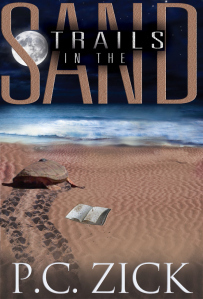
Click on cover
Trails in the Sand – .99 cents for the month of April on Kindle
***Love Triangles, Endangered Sea Turtles, and BP’s Oil Spill
***A Florida Novel by award-winning Florida author, P.C. Zick
When environmental writer Caroline Carlisle sets off to report on endangered sea turtles during the BP’s oil spill, the last thing she expects is to uncover secrets – secrets that threaten to destroy her family, unless she can heal the hurts from a lifetime of lies. To make matters worse, Caroline’s love for her late sister’s husband, Simon, creates an uproar in a southern family already set on a collision course with its past.
From Caroline’s sister: “My sister is nothing more than a common whore,” Amy said when Simon told her he was leaving her. “You just have to face it and get over some childhood notion about her being your soul mate.”
On BP’s oil spill: “Two weeks after the Deepwater Horizon explosion, dead sea turtles began washing up on the beaches near Pass Christian, Mississippi. Beach walkers discovered the stranded animals on sand darkened by the blood seeping from the turtles’ nostrils and underbelly.”
Using BP oil spill timeline and facts as the backdrop, Trails in the Sand explores the fight to restore balance and peace, in nature and in a family, as both spiral toward disaster.
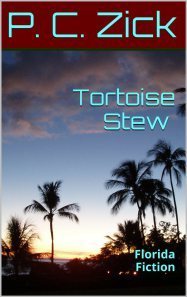
Click on cover
Tortoise Stew – .99 cents for the month of April on Kindle
Florida Fiction filled with intrigue, corruption, twisted love, and outrageous Florida characters
A Florida Environmental Novel from Award-winning author, P.C. Zick
Small town politics at its best, worst, and wildest in this novel about the development of Florida at any cost.
“The bomb sat in a bag on Kelly Sands’ desk for an hour before she noticed it.” And so begins the raucous journey through small town Florida politics in Tortoise Stew.
Kelly Sands, a reporter, covers some of the more controversial and contentious issues in a small Florida town. Dead armadillos and gopher tortoise carcasses left as calling cards to those opposing the development of rural Florida show small town politics at its worst.
Commission meetings erupt into all-out warfare. With the murder of one commissioner and the suicide of his wife, Kelly begins an investigation that threatens to topple the carefully laid plans of the developers and politicians to bring a movie studio and landing strip within the city limits of the small town. When a semi-truck from Monster Mart runs over and kills a young girl, the environmentalists become even more vocal against the developers’ plans. All the while, Kelly struggles to overcome and escape her past, which catches up to her as she follows the antics of the politicians, developers, and environmentalists. With the help of her boss, Bart, and her best friend, Molly, she uncovers more than corruption in small town politics.


March 29, 2014
From Virtual to Live Friend
 Originally posted on Living Lightly:
Originally posted on Living Lightly:
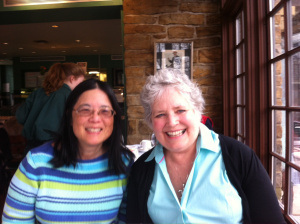
Rachelle and P.C.
I’m fortunate to have a load of virtual friends and fellow authors through my blogs and my writers’ group. When I first started my leap into Indie Authordom, one person appeared in my online life and has remained constant. She writes under the name, Rachelle Ayala, and she was the first to appear on my Author Wednesday posts over at Writing Whims.
I’ve read all her books and reviewed them. I belong to two writing online groups in which she’s involved. I even joined a class she’s teaching on how to write a romance in a month.
We’ve exchanged personal emails and feel we know one another through our novels and through our personal sharing, yet we’ve never laid eyes on one another, until yesterday.
Rachelle posted that she was visiting Pittsburgh and I told her she would be in my part of the world. She…
View original 154 more words


March 28, 2014
Book Review Friday – Yesterday Road
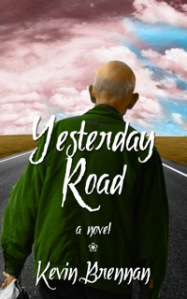 I once read that all memory is fiction. What remains rather than specific details is the perception and the ghost of emotions garnered from that memory.
I once read that all memory is fiction. What remains rather than specific details is the perception and the ghost of emotions garnered from that memory.
Yesterday Road by Kevin Brennan shows the fiction of the memory is the most important.
Jack in Yesterday Road finds himself on the road a few hours from San Francisco one day with no memory of who he is or where he’s been. He hooks up with a Down syndrome young man named Joe, and the two travel in an innocent cocoon until adopted by Ida who doesn’t know that her waitress uniform conceals a big heart.
Jack’s memory of his past comes to him at night in his dreams as some form of fiction. He remembers snatches of things and knows from the things he says that he was a good man with a strong family. Without the facility to name those things from his past, including his own name, he leads with his instinct and shows those he meets great kindness and offers them a way to live in the present.
The agony of Alzheimer’s is portrayed in Jack’s knowing he won’t remember things if he goes to sleep. One night he stays up purposefully so he won’t forget Joe. As he knew would happen, Joe is gone from his memory the next time he sleeps.
His memories of the past come fleetingly, and he remembers them enough to take him to the place he knows was once home. He hears the voices of his parent, such as the words of his mother:
“Everyone follows his own path, she said. Remember that. Once you start out, you’re the only one who knows the right way to go.”
Those words carry him forth to where he knows not, but he continues on his journey aided by the kindness and love of Ida who abandons her own life for a few days to help Jack find his way.
Yesterday Road takes the reader on a weeklong odyssey with Jack and a cast of characters. The relationship between Jack and Joe is one of the sweetest. Jack knows that Joe can’t take of himself; and Joe knows that Jack can’t remember anything. Between the two of them, they manage to pull off a few miraculous acts. Those of us with most of our faculties intact probably couldn’t pull off half of what these two men do.
Brennan’s novel creates a poignant tale of what it means to be a victim of Alzheimer’s. Two people close to me suffered through this disease, and the worst stage for both of them occurred in the shadow stage of the disease. They knew they had it; they knew they forgot things; they knew enough to cry for what they’d lost even though they couldn’t always remember what it was. Jack is in this stage, and at times, it’s painful to read, but it’s important to read.
I started this book on Monday night and finished it the next day. It’s not a long book, but it’s filled with well-drawn character sketches, particularly of Jack, Joe, and Ida. But Brennan also writes with vivid precision of the minor characters to help move along the plot without clogging its progression.
Brennan’s writing is concise and clear, and correct. These are what I call the three C’s of writing. His depiction of Alzheimer’s is correct. The heartbreak of the disease is clear through the dialogue and actions of Jack. And his language is concise as he moves the plot along without stopping to smell the flowers on the side of the road as these road warriors travel from San Francisco to Salt Lake City to Omaha to Wisconsin.
I recommend giving this book a try if you want to immerse yourself in three very likable and charming characters who come to life in such a way that the fiction of our memory doesn’t matter so much as the effect it has on our living now.
Click here to read my interview with Kevin Brennan on Author Wednesday.


March 26, 2014
Author Wednesday – Kevin Brennan
 Welcome to Author Wednesday! One year of posts introducing authors and their work to the followers of this blog has been a most pleasant journey. Today I welcome Keven Brennan, the author of several works of literary fiction. In his latest work, Yesterday Road, a “coming-of-old-age” tale, Jack Peckham finds himself on a journey into his distant past, helped along the way by Joe Easterday, a young man with Down syndrome, and Ida Pevely, a middle-aged waitress with her own mountain of regrets. According to Kevin, “We all tow our histories behind us as we make our way down Yesterday Road.”
Welcome to Author Wednesday! One year of posts introducing authors and their work to the followers of this blog has been a most pleasant journey. Today I welcome Keven Brennan, the author of several works of literary fiction. In his latest work, Yesterday Road, a “coming-of-old-age” tale, Jack Peckham finds himself on a journey into his distant past, helped along the way by Joe Easterday, a young man with Down syndrome, and Ida Pevely, a middle-aged waitress with her own mountain of regrets. According to Kevin, “We all tow our histories behind us as we make our way down Yesterday Road.”
Welcome to Author Wednesday, Kevin. I’m so glad you dropped by today to tell us a bit about Yesterday Road. What’s your pitch for this book book?
Jack Peckham is trying to find his way home. Home’s a tough nut to crack.
If Jack is the protagonist, who or what is the antagonist in your book?
The real antagonist in this book is memory. I have two characters struggling with it: one, Jack Peckham, who has a form of dementia that is preventing him from remembering anything about his past life, and the other, Ida Pevely, who wishes she could escape some of her more troubling memories.
So, though memory isn’t a character per se, I enjoyed playing with its possibilities, such as the way it isn’t always reliable or accurate and how it is always embedded in us even if we can’t call something up on demand. Jack has his entire history in his mind, but his mind has built a wall around certain painful things.
That’s so very true. We store away the emotion, if not the actual memory. I believe that all memory is fiction; just sit in on any family reunion of people raised in the same household. What type of research did you do in the writing of this book?
I did quite a bit of research about Alzheimer’s disease and other kinds of memory loss, since that’s Jack’s main characteristic. I also have a character with Down syndrome, thirty-year-old Joe Easterday, so I did a lot of research on that, too. I wanted to make sure I was creating a realistic character, but one who could also carry some weight in scenes and dialogue.
Without giving us a spoiler, tell us a little bit about your favorite scene in this book.
I have quite a few favorite scenes, actually. There are a lot of funny, poignant moments. But I think the first one a reader will come across is a scene where Jack and Joe get abducted by a hapless carjacker named Steve, who’s trying to get out of the reach of his bookie. That scene kind of sets the tone for the middle of the novel.
That sounds great. I just downloaded to my Kindle, so I look forward to that scene and others that I’m sure are equally enticing. What is the best thing someone could say about this book?
The best I’ve heard so far from a number of readers is that they didn’t want the book to end. That’s a fantastic feeling.
I agree that hearing those words from a reading keeps me going. It’s always interesting to hear when other authors find their voice. Do you know when first discovered yours?
Though I was already writing fiction in high school, I don’t think I really landed on my own voice or approach until I dug in and began a novel in my late twenties. Until then, I was probably emulating my favorite writers too much, but attempting a novel showed me how I could use different techniques and tones to get the effects I wanted. I discovered the possibilities of multiple points of view, nonlinear narrative, and use of thematic motifs, and that’s when I understood I had to be a novelist.
That’s not unusual to emulate at first. But at some point, it’s time to put down what others have done and pick up our own voice. Rachel Carson, author of Silent Spring said she never chose a subject because as a writer, the subject chose her. Has this ever happened to you?
Quite a while ago now, I stumbled upon a small factoid in the newspaper that described something I would never have thought to write about (baseball in prisons). I couldn’t stop thinking about it, and over the years I’ve been working on a novel based on it.
That’s an interesting one. I think you’re supposed to write that book. Do you have similar messages or themes that you try to convey to your readers?
I keep gravitating to identity themes, for some reason, especially the idea that we are what other people see us as. I don’t happen to believe that as a philosophy of life, but it’s really ripe territory for fiction.
Does setting play a role in your books?
Sometimes it has a very large role, as in my first novel, Parts Unknown. There the setting of Sonoma dairy country has had a major influence on the characters, between the stark beauty of the place and the harsh working conditions for dairy farmers back in the ‘40s. The main character, Bill Argus, has also banished himself to the California desert, which suits his assessment of himself.
There the setting of Sonoma dairy country has had a major influence on the characters, between the stark beauty of the place and the harsh working conditions for dairy farmers back in the ‘40s. The main character, Bill Argus, has also banished himself to the California desert, which suits his assessment of himself.
Other times, the setting is more of a backdrop, as is San Francisco in my next book. It simply provides the right urban vibe for the action.
Both settings sound very powerful. All of your books are in the genre of literary fiction. Do you plan to continue writing in the same genre?
Well, I always write what I like to think of as literary fiction, but I also like to apply the techniques of literary fiction to other genres. My next book is essentially chick lit. I also have a dystopian novel, and I’m developing a thriller, a couple more comedic novels, and a historical novel. I don’t like to repeat myself!
Chick lit, huh? That’s quite a leap. Be sure to stop by when you’ve published that one. What’s the best thing said about one of your books by a reviewer?
People have said a lot of nice things about my latest book, Yesterday Road, but I always go back to a reviewer of Parts Unknown (from the Denver Post) who said I had proved that male authors can write female characters convincingly. It really bolstered my confidence and reassured me that it’s not a big risk to attempt that. Characters are people, after all. And they should also be unique, so that stereotypes and gender roles are often off the table.
That’s quite high praise. How about your preferences when writing? Do you listen to music while you write?
I do listen to music, and it can be anything from classical to jazz to indie to electronic. I tend to prefer instrumental music while I write though. Lyrics seem to distract.
I’m the same way. I love lyrics, and I tend to sing along and I can’t do that when I’m writing. What do you do during your down time?
I’m trying to get better at jazz guitar. I bought a very nice Gibson last year, and I feel I owe it some dedicated practicing.
Good luck with that. Thank you so much for stopping by Kevin. I look forward to reading Yesterday Road and your other books.
Readers: From April 1 through April 7, Yesterday Road will cost $1.99 instead of the regular $3.99.
 About Kevin Brennan: Kevin, author of Parts Unknown (William Morrow) has rung in the new year in Red Square, performed as a busker in the London Underground, wandered the California desert, and auditioned unsuccessfully for a chance at stardom on reality television. He and his wife live in Northern California.
About Kevin Brennan: Kevin, author of Parts Unknown (William Morrow) has rung in the new year in Red Square, performed as a busker in the London Underground, wandered the California desert, and auditioned unsuccessfully for a chance at stardom on reality television. He and his wife live in Northern California.
Links
Yesterday Road (October 2013, literary fiction/humor)
Amazon
Barnes & Noble
iTunes
Sony
Kobo
Smashwords
 Our Children Are Not Our Children (August 2013, flash fiction)
Our Children Are Not Our Children (August 2013, flash fiction)
Amazon
Barnes & Noble
iTunes
Kobo
Smashwords
Sony
Parts Unknown (January 2003, literary fiction, William Morrow/HarperCollins)
Direct from author (signed & inscribed)


March 24, 2014
Cover Reveal from annamaria bazzi
The day has finally arrived. I would like to present to all of annamaria’s readers the wonderful cover for:
Book: Incantation Paradox
Author: annamaria bazzi
Cover Designer: Natasha Brown
Release Date: Undetermined
Blurb:
A car accident cuts Dolores Reynard’s life short, leaving her with a long list of unfulfilled dreams. When she awakens in a strange bed, inside a much younger body, and living with a new family—she can’t worry she might be going insane. How can she be a teenager again?
Jason Richmond understands the danger awaiting his new houseguest. Wanting to ease her concerns, he works to earn Dolores’ trust. But attraction flares in the most unexpected way, and he finds himself caught between setting the situation right and following his heart.
An enduring evil threatens not only the blossoming love but their lives as well. As Dolores and Jason struggle to unravel the truth behind her resurrection, they find themselves tangled in a web of murder, intrigue and magic. Only together can they hope to overcome the incantation paradox holding them captive.
Dolores:
 Hello, my name is Dolores and I’m a forty-something mother of two high school girls, Ella and Chloe. On my way to their recital, I was in a car accident that changed my life forever. We all desire to be young again, but never in someone else’s body.
Hello, my name is Dolores and I’m a forty-something mother of two high school girls, Ella and Chloe. On my way to their recital, I was in a car accident that changed my life forever. We all desire to be young again, but never in someone else’s body.
If you think magic doesn’t exist, think again. There truly are people in the world who can wield magic, and I’m not talking the illusion kind we see on stage, I’m talking real magic, the magic you read in books with wizards and sorceresses. You don’t have to take my word, read my story and find out for yourself the ordeal I had to go through to find my way back home.
Author Bio:
Although born in the United States, annamaria bazzi spent a great deal of her childhood in Sicily, Italy, in a town called Sciacca. Italian was the language spoken at home. Therefore, she had no problems when she found herself growing up in a strange country. Upon returning to the states, she promised herself she would speak without an accent. She attended Wayne State University in Detroit Michigan, where she obtained her Bachelor of Science in Computers with a minor in Spanish.
annamaria spent twenty years programming systems for large corporations, creating innovative solution, and addressing customer problems. During those years, she raised four daughters and one husband. Annamaria lives in Richmond Virginia with her small family where she now dedicates a good part of her day writing.
You can visit annamaria at:
Blog – website – Facebook page – twitter – Amazon – email
Check in on Kendíka’s Facebook page





